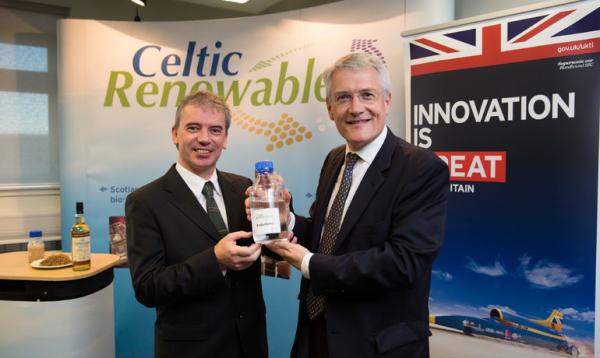BAM Commits Support to Hydrotreated Vegetable Oil as Fuel Source
Construction firm BAM has published a position paper on the use of biofuels, lending its support to hydrotreated vegetable oil as a carbon-saving fuel source. The...
Read Full Article
Edinburgh-based Celtic Renewables was winner in a competition run by the Department for Transport (DfT), earning an £11million grant to help it build the world’s first plant dedicated to the production of advanced biofuel from the residues of the whisky industry.
The company is one of three advanced biofuel producers to share in a £25million funding pot. Andrew Jones, the UK Transport Minister at Celtic Renewables’ headquarters at Edinburgh Napier University, announced the winners. It will use the funding to build a biofuel facility that will be operational by December 2018, producing at least 1 million litres of biofuel, capable of powering cars, every year.
The process, that uses bacterial fermentation to produce advanced biofuels from carbohydrates such as starch and glucose, was originally devised in the UK at the start of the last century to produce acetone for explosives used in the First World War. It was phased out in the 1960s due to competition from the petrochemical industry.
Professor Martin Tangney, the company’s founder and President, said he was delighted with the award which would allow it to create Europe’s first facility for acetone-butanol-ethanol (ABE) fermentation for 50 years. “We are committed to developing a new industry right here in the UK that will be worth more than £100million-a-year and it starts here.”
Professor Tangney went on to state that the company has already attracted investment and partners in the private sector and this funding would allow it to scale-up to industrial production.
“Our next step is to open a demonstration facility and we are targeting a location in or near Grangemouth which is an area that’s strategically right for us,” he confirmed.
Celtic Renewables is a ‘spin-out’ company from the Biofuel Research Centre (BfRC) at Edinburgh Napier University and has spent the last 18 months developing its process as part of a £1million programme funded by the DECC under its Energy Entrepreneurs Fund.
BSRIA has expressed its delight at the award to Celtic Renewables. “Using the leftovers from the whisky industry to create a fuel source that contributes to the low carbon fuel we all want – and that can help the UK reach its renewable targets for 2020 – is, not only resourceful but fantastic news,” stated Julia Evans, CEO, BSRIA. “Celtic Rewnewables should be applauded for leading the way and demonstrating how such renewable technologies can make an impact.”
The other companies that won funding in the DfT competition are Teesside-based Nova Pangaea which produces biofuel from forestry waste and Swindon-based Advanced Plasma Products.
Picture: Our image shows a delighted Professor Martin Tangney, the company’s founder and President, receiving the £11 million award from Andrew Jones, the UK Transport Minister
Article written by Mike Gannon | Published 16 September 2015
Construction firm BAM has published a position paper on the use of biofuels, lending its support to hydrotreated vegetable oil as a carbon-saving fuel source. The...
Read Full ArticleAnyone using biodiesel for their generators or for their fleets should know that increasing imports of Used Cooking Oil to the EU for use as biodiesel feedstock could...
Read Full ArticleAlong with fleet operators, there are more and more companies that can afford biofuel generators searching for used cooking oil based fuels - but there are concerns...
Read Full Article